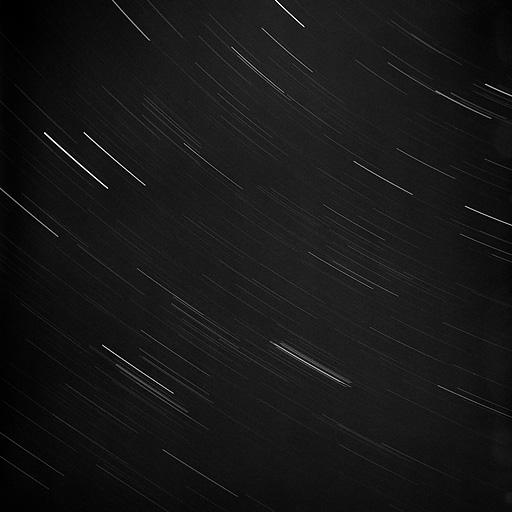|
No spots or other marks visible on the Sun.
|
|
I started out the session by seeing if comet Holmes was still visible to the naked eye.
Given that the
last time I saw it it appeared to be about the same
brightness as the Double Cluster, and given that
I could see the Double Cluster, I guessed I stood a chance of it
was still of similar brightness to the last time.
After looking carefully for a couple of minutes I decided that
it must be even fainter than the last time. I then grabbed my
10x50 binoculars and had a look in the
general area around Algol and I pretty much saw it
right away. Very faint and very diffuse. Only just brighter than
the background sky. If I wasn't looking for it I probably
wouldn't even have noticed it.
|
|
I set the Lomo Lubitel 166B up on a tripod
and started a star trail.
The camera was loaded with Ilford FP5+ 400 (120 roll film), the
aperture was set to f8. Like the last time I tried this this was
an experiment. This time I was interested to see what results
I'd get with a faster film.
The camera was roughly pointed in the general direction of the
Pleiades (M45) and the Hyades in
Taurus.
|
|
Had a brief view of Saturn via John's 'scope.
Much like my last
observation the view was very "soft" with no real
detail visible. No shadow of the rings on the planet could be
seen although, once again, I did get the impression that the
rings were two separate and detached objects either side of the
planet.
Titan was nicely visible.
|
|
Had a look at Mars via the
905 with the 6mm
eyepiece and the 2x barlow.
Just like always, I couldn't get any detail out of the planet.
One thing I did notice though was that there was a definite hint
of a gibbous phase. The planet did seem to be "taller" than it
was "wide".
|
|
Stopped the star tail I'd started earlier.

|
|
Decided to have a look at M1 given that I'd
not taken a look in over a year. With the
905 and the 25mm
eyepiece it was very easy to find and, unlike
previous observations, seemed to stand out really well. Despite
the conditions during the evening (which were less than ideal)
I'm pretty sure it was a better view than the one I once had via the
130M. Although it was the usual indistinct light patch
it appeared to contrast with the background sky better than I'm
sure I've seen it before.
|
|
Had a look at M65 and M66
via John's 'scope and his 42mm eyepiece. Just two very faint
patches of light, mostly needing averted vision
to see them. It was impossible to make out any distinct shame or
to say what their relative orientations were.
|
|
Had a coffee and food break and a chat. Given that it was
getting very cold and damp this was needed.
|
|
Had a look at M95 and M96
via John's 'scope and his 42mm eyepiece. Just as with the
previous
view of M65 and M66
they appeared as two very faint patches of light, mostly needing
averted vision to see them.
|
|
I went to use the 905 and noticed that it
was dripping with dew and that the main lens was totally fogged
up. Decided to call it a night as far as the 905 was concerned.
|
|
We spent some time using John's 'scope to try and locate the
Eskimo Nebula but never managed to locate it. I
made a note to check in some of my books and see how easy it
should be to locate.
|
|
Given that Canes Venatici was quite high up now we decided
to have a look at M3 with John's 'scope. I
first found it with my monocular to be
sure of the location and then we got it in John's 'scope. With
his 42mm eyepiece it was obvious that it was a globular
cluster although no detail could be seen. Switching to
his 15mm eyepiece we could see a hint of mottling in it giving
the impression of a collection of starts without resolving any
actual stars.
|
|
By 23:55 UT everything was terribly damp
so we decided that it was time to call an end to the session.
|
